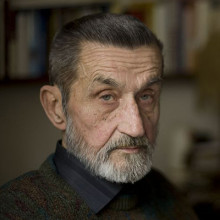Polish literature

Marek Nowakowski
(1935-2014), one of the most prolific practitioners of post-war Polish prose, a master of minor narrative forms, and a creator of Polish "dirty realism".
He published his first story, Rectangular, in Nowa Kultura in 1957. Rectangular and the subsequent collections That Old Thief and Benek the Flower Seller firmly located Nowakowski in the "dirty" world of social outcasts, vagrants, prostitutes, pickpockets and fences who live beyond the concerns and codes of "normal" society. Nowakowski both described and revelled in this colorful, Steinbeckian world. For Nowakowski, the vagrant and his subculture are characterized by both brutality and a rigorously respected ethos - by autonomy from the material ideals of the bourgeoisie but also by internal solidarity. In his novels, Nowakowski expanded his range of dirty realism. Aside from his old protagonists, he brought in average, everyday, modest figures (clerks and shopkeepers) who live out their lives until the moment when they experience the feeling of being "cornered" - when they realize the absurdity of the norms to which they have submitted, and which now prove incapable of answering the most fundamental existential questions. Having discovered that they are trapped inside a "Done Deal," they escape into the periphery where, free of the previous rules, they can gradually sink into abnegation (or into alcoholism, psychological obsessions, or profligacy) or achieve authenticity, which in this case is understood by the writer as an existence without goals. Nowakowski's most accomplished and eye-opening work of this period is the story The Wedding Reception Again, in which he uses the wedding feast - one of the central motifs in Polish literature - to illustrate the rules by which small-town power is exercised, as well as the pragmatism of the public attitudes that negate tradition and annihilate all existing codes of values. The poetics of dirty realism also permit Nowakowski to express the fundamental dilemmas of his own writing. The abundant self-references in his work - Insects, The Prince of Night, and The Boy with the Pigeon on his Head - attest to his conception of his own position "in between" - between the world of the social margins and the mainstream where literature is made, between the authenticity of the vagrant and the unauthentic roles proffered by official culture, between the colorful but coarse language of the outcasts and the dead language of literature or the newspapers. A Report on Martial Law won Nowakowski European renown. That and his subsequent books showed Nowakowski portraying the everyday life of average citizens and the historical processes as a result of which the whole of society found itself on the periphery of a totalitarian state because of the code of values that the society professed and practiced. Nowakowski found an escape from such political tendentiousness in the self-referring Portrait of the Artist as a Mature Man, Mardi Gras and Lent, and the crucial story Bozydar from the collection The Greek Divinity, in which he placed himself on the periphery of society while isolating himself from all engagement and leaving to literature the expression of the most sensitive themes: creative solitude, biological transience, and ruthlessness as a rule for social coexistence. There followed a series of books on the new Poland: Homo Polonicus, the Greek Divinity, and Shots in the Motel George, which depict the Poland of the late 1980s and early 1990s as a bazaar, a place where everything and everyone is for sale. The counterweight to that image of the transformation of social bonds into commercial relations is the nostalgic return to Warsaw immediately after the war, and its colorful demi-monde of eccentrics, weirdos and "crooks with class," in Powidoki. "I looked at the papered-over desk. Writing as an act of defense. A response to attacks. A zone of freedom. Mine alone."
The Greek Divinity
BIBLIOGRAPHY
- Benek Kwiaciarz, Warszawa: Czytelnik, 1961.
- Silna gorączka, Warszawa: Czytelnik, 1963.
- Trampolina, Warszawa: Czytelnik, 1964.
- Zapis, Warszawa: PIW, 1965.
- Gonitwa, Warszawa: Czytelnik, 1967.
- Robaki, Warszawa: PIW, 1968.
- Mizerykordia, Warszawa: Czytelnik, 1971.
- Układ zamknięty, Warszawa: PIW, 1972.
- Książę nocy, Warszawa: PIW, 1978.
- Śmierć żółwia, Warszawa: Czytelnik, 1973.
- Wesele raz jeszcze, Warszawa: PIW, 1974.
- Chłopiec z gołębiem na głowie, Warszawa: PIW, 1979.
- Raport o stanie wojennym (1982 - 1984), Białystok: Versus, 1990.
- Notatki z codzienności (grudzień 1982 - lipiec 1983), Warszawa: Czytelnik, 1993.
- Dwa dni z aniołem (1984), Poznań: Kantor wydawniczy SAWW, 1990 (1 wydanie pierwszoobiegowe).
- Wilki podchodzą ze wszystkich stron (1985), Warszawa: PIW, 1990.
- Grisza, ja tiebia skażu (1986), Poznań: SAWW, 1990.
- Portret artysty z czasów dojrzałości, Warszawa: Iskry, 1989.
- Karnawał i post, Warszawa: NOWA, 1989.
- Homo polonicus, Warszawa: Pomost, 1992.
- Powidoki, Warszawa: Alfa Wero 1995.
- Strzały w motelu George, Warszawa: Most, 1997.
- Rajski ptak i inne opowiadania, Warszawa: Wydawnictwo Książkowe Twój Styl, 2000.
- Empire, Warszawa: Twój styl, 2001.
- Mój Słownik PRL-u, Warszawa: Alfa-Wero, 2002.
- Opowiadania uliczne, Warszawa: Wydawnictwo Książkowe Twój Styl, 2002.
- To wolny kraj, Warszawa: Wydawnictwo Książkowe Twój Styl, 2004.
- Nul, Warszawa: Alfa, 2004.
- Stygmatycy, Warszawa: Prószyński i S-ka, 2005.
- Nekropolis, Warszawa: Świat Książki, 2005.
- Sierota Europy, Warszawa: Alfa-Wero, 2006.
- Gdzie jest droga na Walne?, Warszawa: PIW, 2007.
- Syjoniści do Syjamu, Warszawa: Świat Książki, 2009
- Domek trzech kotów, Warszawa: Świat Książki, 2011
- Dziennik podróży w przeszłość, Warszawa: Iskry, 2014
TRANSLATION
German:
- Die schrägen Fürsten, Berlin: Henssel, 1967.
- Karpfen für die Miliz [Raport o stanie wojennym], München: Hanser, 1983.
- Kopf und andere Erzählungen [Zapis], Frankfurt a.M.: Suhrkamp, 1967.
- Skandal im Städtchen [Zdarzenie w miasteczku], Berlin: Volk und Welt, 1992.